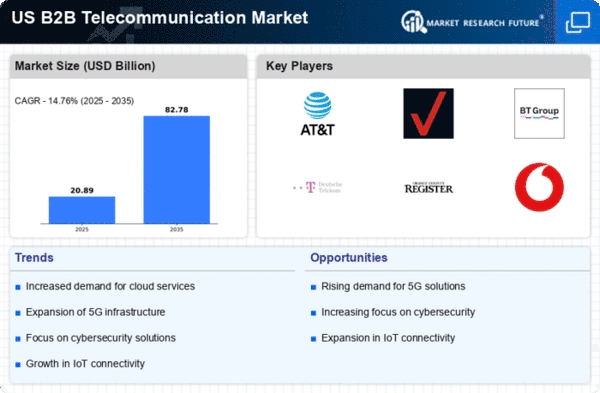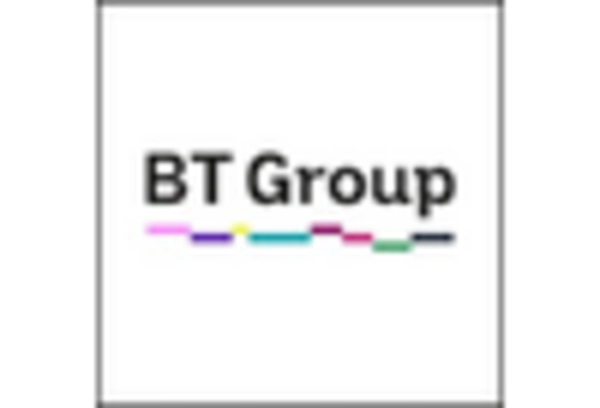Growth of IoT Applications
The proliferation of Internet of Things (IoT) applications is a significant driver for the B2B Telecommunication Market. As industries increasingly adopt IoT technologies, the demand for reliable and scalable connectivity solutions has surged. This trend is particularly evident in sectors such as agriculture, manufacturing, and transportation, where IoT devices facilitate data collection and automation. According to industry forecasts, the number of connected IoT devices is expected to exceed 30 billion by 2030, creating substantial opportunities for telecommunication providers. The ability to support these devices with robust network infrastructure is crucial for businesses aiming to leverage IoT for operational efficiency. Consequently, the b2b telecommunication market is likely to experience accelerated growth as it adapts to the evolving needs of IoT applications.
Expansion of 5G Infrastructure
The ongoing expansion of 5G infrastructure is a pivotal driver for the B2B Telecommunication Market. As businesses increasingly rely on high-speed connectivity, the deployment of 5G networks facilitates enhanced data transfer rates and reduced latency. This technological advancement is expected to bolster various sectors, including manufacturing and logistics, by enabling real-time data sharing and IoT applications. According to recent estimates, the 5G rollout could contribute approximately $500 billion to the US economy by 2030, underscoring its potential impact on the b2b telecommunication market. Furthermore, the ability to support a higher density of connected devices positions 5G as a critical enabler for smart cities and automated operations, thereby driving demand for advanced telecommunication services.
Increased Focus on Cybersecurity
As cyber threats continue to evolve, the emphasis on cybersecurity within the B2B Telecommunication Market has intensified. Businesses are increasingly aware of the vulnerabilities associated with digital communication, prompting them to invest in robust security solutions. The market for cybersecurity services is projected to grow at a CAGR of 10% through 2027, reflecting the urgent need for protective measures. This trend is particularly relevant for sectors such as finance and healthcare, where data integrity is paramount. Consequently, telecommunication providers are compelled to enhance their security offerings, integrating advanced encryption and threat detection technologies. This shift not only safeguards client data but also fosters trust, which is essential for sustaining long-term business relationships in the b2b telecommunication market.
Regulatory Compliance and Standards
Regulatory compliance and standards are increasingly influencing the B2B Telecommunication Market. As businesses navigate complex legal frameworks, the need for compliance with data protection and telecommunications regulations has become paramount. This is particularly relevant in industries such as finance and healthcare, where stringent regulations govern data handling and privacy. Companies are compelled to invest in telecommunication solutions that not only meet these regulatory requirements but also enhance their operational resilience. The market for compliance-related services is projected to grow significantly, as organizations seek to mitigate risks associated with non-compliance. This trend underscores the importance of regulatory adherence in shaping the offerings within the b2b telecommunication market, as providers must align their services with evolving legal standards.
Demand for Unified Communication Solutions
The demand for unified communication solutions is reshaping the B2B Telecommunication Market. Businesses are increasingly seeking integrated platforms that combine voice, video, and messaging services to streamline operations and enhance collaboration. This trend is driven by the need for remote work capabilities and the desire for seamless communication across various channels. Recent data indicates that the unified communications market is expected to reach $200 billion by 2026, highlighting its significance in the b2b telecommunication market. By adopting these solutions, organizations can improve productivity and reduce operational costs, as they eliminate the need for multiple disparate systems. This consolidation of communication tools is likely to become a standard practice, further propelling growth in the b2b telecommunication market.
















